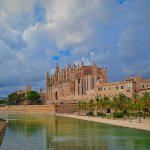Day of the Balearic Islands in Spain Date in the current year: March 1, 2026
 The Day of the Balearic Islands (Día de les Illes Balears) in Spain is celebrated annually on March 1. It is a public holiday in the autonomous community of the Balearic Islands which commemorates the entry into force of its Statute of Autonomy.
The Day of the Balearic Islands (Día de les Illes Balears) in Spain is celebrated annually on March 1. It is a public holiday in the autonomous community of the Balearic Islands which commemorates the entry into force of its Statute of Autonomy.The Balearic Islands are an archipelago in the western Mediterranean Sea, consisting of four large islands (Mallorca, Menorca, Ibiza, Formentera) and many minor islands and islets, including Cabrera, Dragonera, and S’Espalmador. The islands form an autonomous community and a province of Spain, with Palma, unofficially known as Palma de Mallorca, as the capital.
It is not known for certain when the exactly the Balearic Islands were first inhabited, but mentions of their earliest inhabitants can be found in ancient Greek sources. For example, Lycophron claimed that the first settlers were shipwrecked Boeotians.
Phoenicians were the first to conquer the archipelago. After the fall of Carthage, the islands were virtually independent for some time, before being conquered by the Roman Empire. During the early Medieval period, the islands were successively controlled by the Vandals, the Byzantine Empire, the Umayaad Caliphate, and the Emirate of Córdoba.
In 1113, the Republic of Pisa, the Catalan counties, the County of Provence, the Judicate of Logudoro, and the Papal States launched a crusade against the Balearic Islands. The archipelago was conquered in 1115, but a few months later the Almoravid dynasty reconquered the islands, and they remained under Islamic control for over a century.
In 1229, King James I of Aragon launched the Reconquista of the Balearic Islands. Mallorca was captured first, Menorca followed in 1232, and Ibiza fell in 1235. In 1469, King Ferdinand II of Aragon married Queen Isabela I of Castile. Their marriage began the familial union of Castile and Aragon and the formation of Spain. Thus the Balearic Islands became part of the Spanish state (although Menorca was controlled by Britain for most of the 18th century and was returned to Spain by the 1802 Treaty of Amiens).
During the Spanish Civil War, Menorca was the only one of the Balearic Islands to stay loyal to the government of the Second Spanish Republic, while the rest of the archipelago supported the Nationalists led by Francisco Franco. Mallorca was occupied by Fascist Italy throughout the war and was returned to Spanish control after Franco’s victory.
After the fall of Franco’s regime and the beginning of Spain’s transition to democracy, a new constitution was adopted. Among other things, the 1978 Constitution of Spain granted broad rights to autonomous communities. The Balearic Islands became one of such communities. Their Statute of Autonomy was approved on February 25, 1983 and came into force on March 1 of the same year. Its most recent revision came into effect on March 1, 2007.
The anniversary of this event is celebrated as the Day of the Balearic Islands. It is the official holiday of the autonomous community and a non-working day. On the occasion of the Day of the Balearic Islands, various festive events (concerts, parades, exhibitions, sports competitions, medieval fairs, street parties, children’s events) take place on all four main islands of the archipelago.
- Category
- Anniversaries and Memorial Days
- Country
- Spain
- Tags
- Day of the Balearic Islands in Spain, holidays in Spain, holidays in the Balearic Islands, Statute of Autonomy of the Balearic Islands